FOOD FOR MEN
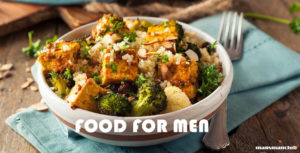 I continue coverage of healthy lifestyles for men. This is the second part.
I continue coverage of healthy lifestyles for men. This is the second part.
Please read the first part about the air and water here:
https://mansmanclub.com/lets-take-some-steps-for-a-healthier-life/
Let's talk about food. You may be wondering why should we discuss it? First of all, food is one of the physical pleasures for men, in particular. Am I right? Secondly, not every food is good for men.
Let me assure you, you will raise your eyebrows not once as you read through the post.
I am not gonna tell you about any special diet. It is not about losing weight with some supplements but rather about the food that makes men healthier and stronger, and about the food to avoid.
This article is quite big, so, proceed with patience. 🙂
The Food and the Hormones
Is there any food that is different for male from the food consumed by other members of your family that start with the letter "f"?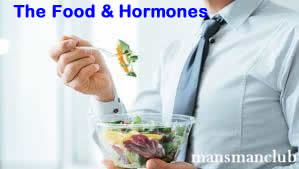
You bet!
Men's body needs vital vitamins and minerals that support not only general health but also support the healthy level of the big "T".
Just don't tell me that you know what to eat based on "professor Google" recommendations. You will find there a bunch of promotions, quick "fixes", and even gimmicks.
Your goal should be to eat certain food to naturally increase testosterone levels for as long as you live. And if you really want to produce high "T" levels, it should start with your lifestyle (I have already covered it earlier), and more importantly, with your diet.
Before going into details, you should know that there are some hormones in the male body that negatively affect the "functionality" of your man's organ.
#1. Estrogen.
#2. Cortisol (stress hormone)
The first one, I call the "woman hormone" since it is good for women but is an enemy of "T" (man’s hormone). Then more of "e" in your body, then, correspondingly, less "T".
Some food can deliver more "e" to your stomach, so you should know what to avoid.
I was surprised to learn that flax seeds, soy, mint, black licorice, alfalfa, and even green tea (can you believe it?) are a big no-no for men.
I have learned about two years ago that soy and all products with soy are generally bad for humans due to certain negative reactions of our bodies.
When researchers began taking a closer look to find out what made soy so healthy, they ran into some surprises. Soy, it turned out, contains estrogen-like compounds called isoflavones. And some findings suggested that these compounds could promote the growth of some cancer cells, impair female fertility, and mess with thyroid function.
At the same time, other studies were still showing that soy consumption could cure high cholesterol and help women cope with the symptoms of menopause. Add it all up, and you can see how this little green bean became a source of mass dietary confusion.
My approach? There is no smoke without a fire. I did not find more articles about the harm from soy but, as my friend likes to say “just in a case”, I am trying to stay away from soy.
Do you like sushi? I love them! The way Americans eat sushi is by dipping them into a mix of very salty soy sauce with a small portion of wasabi. I won't discuss that they are mostly the surrogate of real soy sauce and wasabi, but I am trying to avoid them altogether, anyway.
Guess what? I have tried avoiding soy sauce with sushi just adding a little bit more ginger, and I still can enjoy them.
Bread with flax seeds, salads with added alfalfa... stay away from that!
Another big booster of "e" is extra weight. You can learn if you carry extra pounds by searching Google (it is where you can rely on it). Use your height, your age, and gender as variables.
If you have more than 15% of extra weight, it is a signal to pay an attention to your food intake, the type of drinks with sugar you consume, and the level of your physical activity.
Put it simply, extra weight is an enemy for your testosterone. Estrogen that resides in a man’s body fat turns testosterone into estrogen. It's like one army takes over and turns the enemy's soldiers into its own.
The solution? Cut the body fat.
Do you know the best method to cut it? A son of a friend of mine just lost 30lb. Without a diet, without a special group or fancy services like Weight Watchers or similar.
The solution? He said: “close your mouth".
Was it easy? Probably not.
I found it to be difficult, especially in the beginning. Your body's reaction to limited food intake can drive you nuts, but as your mental power takes over, it will be easier each day.
Here is one trick to use: got hungry? Drink plenty of water before taking any food. Another trick: get physical and get tired by exercising. Again, drink more water.
Eat Slowly
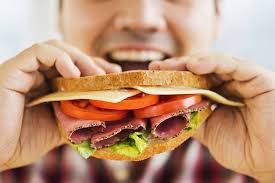 When I was in the Army, I got used to eating fast. No time to chew? Who cares?! Get up and run!
When I was in the Army, I got used to eating fast. No time to chew? Who cares?! Get up and run!
Even so many years are gone, I still have this poor habit. Why poor? First of all, I rarely know when to stop eating and it adds to my weight in the long run. As many of you know, you get the feeling of a full stomach only in 20 min after the food intake. So, if you spend only 4-5 min for eating, you won't know when your belly had enough food, so, you continue eating, eating...
Second of all, when you don't wet your food enough with your saliva, it drops in your stomach not fully ready for digestion. It leads to bloating and generally isn't healthy.
Third of all, due to the slower metabolism, many of the men who are after 40 have big bellies sticking out because they carry pounds and pounds of unprocessed food in the stomach.
Read my article about this matter.
I remember about one experiment.
Two men got the large omelet with 3 eggs, cheese, and some veggies – very tasty. One man has covered his eyes with non-transparent tape.
They could eat with two conditions: to eat slowly, and they must stop eating as soon as they feel satisfied.
Guess what? The man without vision restriction has left his plate empty. But the second one has stopped when he left about 1/3 of the portion.
Eating slowly and mindfully is a much more effective means of keeping the weight down than replacing the china with smaller plates.
When you eat slowly, you are giving your brain and your body time to acknowledge when you're actually full. And if you're still hungry, feel free to clean your plate. Your body is much better at telling you what you need than some outdated study or “recommendations” from Google.
Moral? Man, just keep it in mind. Take time to eat and never hurry, so, you don’t overeat.
Don’t Swallow Marketing Gimmicks Regarding Food Studies
I have learned and verified the facts that these days you can't escape avocados on restaurant menus or in recipes, and for good reason: they're packed with nutrients. They have more potassium than bananas. And they're loaded with fiber and heart-healthy monounsaturated fatty acids.
And those men who are interested in the subject may have recently seen headlines about avocado's link to weight loss. Sounds pretty amazing, right? Even more, the reason to add this superfood to your plate.
But don’t hurry up.
If you dig a little deeper, you'll see something beyond the splashy headlines. The study was made for marketing purposes. It didn't actually find that avocados could curb appetite or help with weight loss. It was a mere six-hour trial investigating the short-term effects of avocados on hunger. It didn't investigate avocados' effects on food intake or body weight.
So why did it get so much press? If you scroll all the way to the bottom of the study, you'll find an interesting tidbit of information. Funding for this study came from the Hass Avocado Board, which admits existing "to help make avocados America's most popular fruit."
Sponsored research like this is all about marketing. Get headlines, grab the consumer's attention. Science against you and me.
I don’t advocate kicking avocados off your plate. They're high in antioxidants and help with osteoarthritis management, however, the problem is that those benefits are not sexy enough for marketers. So, take a closer look the next time you see headlines for the latest and greatest in food science and nutrition. That way you can make an informed decision about what you put into your body… for the right reasons.
Adaptogens… What?!
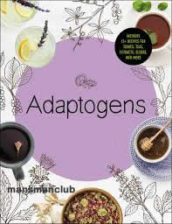 Have you heard about superfoods? I am sure you came across a few articles about useful food. What is interesting is that superfoods are facing some stiff competition from what is being called "super-herbs." And there's a good reason for it.
Have you heard about superfoods? I am sure you came across a few articles about useful food. What is interesting is that superfoods are facing some stiff competition from what is being called "super-herbs." And there's a good reason for it.
“Better known as "adaptogens" by researchers and dieticians, this select group of herbs and mushrooms has a seemingly magical ability to help our bodies handle stress. They can "adapt" their functionality according to of the specific needs of the body. These needs can be physical, chemical, or even biological. They can also aid your immune system and help with exercise warmup and recovery.
What's particularly interesting is the fact that they can possess opposing qualities... and exert seemingly paradoxical effects.
For instance, ginseng (one of the more widely studied adaptogens) has been shown to lower blood pressure in some people while raising blood pressure in others... depending on the individual's needs. This is one of many examples of these "smart herbs" ability to "normalize" things in the body.
Adaptogens help your adrenal glands the same way exercise helps your muscles. They actually tweak hormone production and physiological responses to make sure the body is performing at optimal functionality.
When the body is dealing with stress, adaptogens help adrenal glands mount an immediate hormonal response by making and releasing more stress hormones. And when the stress stops, adaptogens also help adrenal glands shut down more quickly.
I have already discussed the benefits of some health supplements. Below is a list of some of the most promising and popular adaptogens out there and how they help...
Amla (Indian Gooseberry): High in vitamin C and antioxidants, amla has shown to be effective against diabetes and high cholesterol levels.
Ashwagandha: This powerful herb is used by people in the Himalayas to improve resistance to oxygen deprivation. It also helps the nervous, endocrine, and immune systems.
Dang Shen: This herb is said to improve the body's ability to defend against high levels of stress, anxiety, trauma, and fatigue. It has also been studied for its power to reduce colon inflammation.
Ginseng: As mentioned, ginseng's powers are wide-reaching. This includes combating fatigue, being an anti-inflammatory, and is used in the fight against cancer and diabetes.
Holy Basil: This antimicrobial has been used for thousands of years to treat the circulatory, immune and nervous systems. It can also help with memory and concentration.
Licorice Root: Only to be used under a doctor's supervision, licorice root has been shown to increase energy and endurance. It also protects the thymus gland from being damaged by cortisol, which is the stress hormone.
Maca: This "Peruvian ginseng" can increase strength, stamina, and libido.
Reishi: These mushrooms can help treat fatigue, respiratory problems, and liver damage.
Suma: Easily found as a capsule and a dried herb, it is commonly used to improve energy levels and prevent fatigue while boosting immunity.
The nine herbs above share three distinct qualities that make them worthy of your attention. They are all considered nontoxic and generally safe by the FDA. They share broad benefits to the immune system and to multiple organ systems. And they provide balance within the body.
The best part is, you don't have to choose between superfoods and super-herbs to give your body the nutrients it needs to run optimally.
It's Not What You Think…
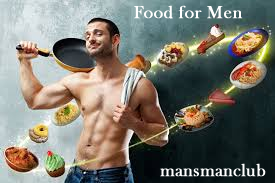 John Mackey - founder and chairman of Whole Foods Market and best-selling author of The Whole Foods Diet: The Lifesaving Plan for Health and Longevity - suggests that if you want to live the longest, healthiest, most disease-resistant life possible, you should eat a 90% plant-based, whole foods diet.
John Mackey - founder and chairman of Whole Foods Market and best-selling author of The Whole Foods Diet: The Lifesaving Plan for Health and Longevity - suggests that if you want to live the longest, healthiest, most disease-resistant life possible, you should eat a 90% plant-based, whole foods diet.
(That's whole foods vs. processed foods, not Whole Foods vs. Safeway.)
You may assume it’s a marketing gimmick but there are mountains of scientific studies to back him up.
And if you want to be healthier still, you should eat across the spectrum. Not just strawberries, for example, but blueberries, raspberries, and blackberries. Not just lettuce, but onions, peppers, beets, tomatoes, and cauliflower. Not just peanuts, but walnuts, pistachios, hazelnuts, and macadamias, not to mention Brazilian nuts – good protection against prostate cancer.
John would prefer that you bought these at Whole Foods. But he would tell you that's not the most important part of your decision. What really matters is what you consume.
Unprocessed foods contain more of the nutrition that the body needs. By contrast, processed foods have a lot of nutritious parts removed in order to increase the shelf life of the product. (Remember those tests of French fries that appeared all over the web? You could leave cooked French fries out in the open air for more than a year and nothing would grow on them - no mold, no bacteria. Those fries would not support the growth of any type of living thing. But those French fries are "plant-based" - however all of the nutritious parts have been removed.)
Easing up on steak dinners in favor of more veggies, fruits, and nuts may be associated with longer, healthier life.
Diets that are higher in plant-based foods (like fruits, vegetables, whole grains, nuts, and legumes) and lower in animal-based foods (like meat, seafood, dairy, and eggs) are linked to a lower risk of having cardiovascular disease or dying from any cause, according to new research published in the Journal of the American Heart Association (and since it’s hard to believe that any specific company would benefit from this study, I intend to believe it).
Plant-based diets, which are relatively higher in plant foods and relatively lower in animal foods, have health benefits and confer benefits for cardiovascular health. These results don’t mean meat lovers need to jump ship completely, but just cutting back a little bit of meat is associated with a lower risk of these conditions.
The researchers analyzed data from more than 12,000 middle-aged adult participants who started off without cardiovascular disease in an epidemiological study from 1987 to 2016. Compared to people who consumed the least plant-based foods, they found, those who consumed the most plant-based foods had a 16% lower risk of having cardiovascular disease, and up to 32% lower risk of dying from cardiovascular disease, and an up to 25% lower risk of dying from any cause.
Roughly one out of every six healthcare dollars goes to cardiovascular disease, according to the Centers for Disease Control and Prevention.
“Our findings underscore the importance of focusing on your diet,” Rebholz said. “There might be some variability in terms of individual foods, but to reduce cardiovascular disease risk people should eat more vegetables, nuts, whole grains, fruits, legumes, and fewer animal-based foods.”
So, guys, as much as we love burgers, keep it in mind, especially as you age.
But Should the Guys Switch to a Vegetarian Diet?
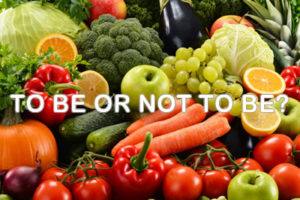 You've probably seen pictures of lines of people waiting around the block for plant-based fried chicken. And vegetarians and investors have been swooning over Beyond Meat company since its IPO in May.
You've probably seen pictures of lines of people waiting around the block for plant-based fried chicken. And vegetarians and investors have been swooning over Beyond Meat company since its IPO in May.
Now even more companies are jumping on the meatless bandwagon.
Kellogg's is releasing a veggie burger called Incogmeato. Hormel's plant-based beef will be called Happy Little Plants. Tyson's already hit the market with its Raised & Rooted meat substitute and will be selling a plant-based shrimp called New Wave.
It's quite a remarkable trend, considering the number of vegetarians in the U.S. hasn't really gone up in the past five years. Nonetheless, they're driving the market... and companies want to cash in on the Beyond Meat fever.
There are three oft-cited reasons for choosing a vegetarian diet. Some point to environmentalism as the reason for giving up meat. Others say eating meat is unethical. And still, others say they chose vegetarianism for health-related reasons.
Today, we're going to focus on that last one: Is vegetarianism actually a healthier lifestyle?
There is a good amount of evidence to suggest cutting meat from your diet lowers your risk of obesity. A vegetarian diet has also been tied to healthy blood pressure and a lower risk of heart disease. One study in 2013 even concluded that vegetarians had a nearly 10% lower risk of developing cancer than meat-eaters.
But some stunning new research should give the meat-free set pause.
A vegetarian diet has been linked to a 20% higher rate of stroke compared to meat-eaters.
Scientists analyzing data from 48,188 people over the course of roughly 18 years came to the conclusion that the increased risk of stroke resulted from a lower level of nutrients in the bloodstream of vegetarians... With special emphasis on essential amino acids and vitamins B-12 and D.
If you don't make the extra effort to ensure you're getting all the nutrients you need on a vegetarian diet; you could be putting yourself in some serious risk.
That doesn't mean you should load up on cheesesteaks to prevent the risk of stroke, though. The point is the human body shouldn't be put to any extreme.
If anything, the study illustrates that a healthy, balanced diet can include a moderate amount of meat. Feeding your belly with the right stuff doesn't have to be rocket science… or require fake meat made in a lab.
Mother Nature has everything we need.
Let me also cover several arguments for and against veganism.
Environmental Argument
To start, the weird push by governments and media that are getting behind the vegan diet...
You hear politicians subtly say that they think everyone should be avoiding meat and they cite false environmental arguments to push this narrative.
It's become thoughtful to be vegan, and politicians want to, at least, seem like they care about the environment. Knowing our politicians, it won't be long before consuming meat is taxed, that's where the trend is headed and I can see that happening if a more liberal-leaning majority is elected.
The problem: harvesting crops produces more greenhouse gases than cattle do.
The concept that cow’s farts are ruining the planet is just false, in fact, both the harvesting of things like corn, wheat, soy, and other crops is far worse, both in gases, in the destruction of the land that's harvested, and in the number of animals that are killed during the process.
Have you ever seen birds following a tractor as a crop is harvested?
Pay attention to it, they're following the tractor because of the massive amount of voles, mice, squirrels, and other small animals that the tractor leaves dead in its wake. Just read Vegetarian Myth by Lierre Kieth, a former vegan.
Health and Veganism
Then, of course, there's the health argument. Please remember: there are nutrients that you don't get access to in quality, quantity, and bio-availability in a vegan diet.
The main ones are high-quality saturated fats (vital for testosterone production), carnitine, and especially B vitamins (which aren't bio-available - namely b12 -or absorbed by the body in vegetable sources, you NEED meat, especially organ meats, to get natural b vitamins).
Then there are creatine and carnosine, which are great for muscle growth.
D3... There are two types of dietary vitamin D — ergocalciferol (D2) found in plants and cholecalciferol (D3) found in animal-based foods. D3 is far more efficient than D2.
Almost as important as b12 and d3 is Docosahexaenoic acid (DHA). Docosahexaenoic acid (DHA) is an essential omega-3 fatty acid. It’s important for normal brain development and function. Deficiency in DHA can have adverse effects on mental health and brain function, especially in children
And then, iron and taurine, both important for your health and to have a functioning body.
From a health standpoint limiting yourself isn't smart. Eat a bunch of meat and eggs, and veggies and fruits.
The Moral Argument
Is killing bad? I am not talking about killing humans, folks.
No. Killing is natural. It's done for survival, and humans have been killing animals since humans have been breathing. We've also been killing plants and fruits (yes, you kill plants before you eat them).
On top of that, the variety of animals killed while harvesting crops, and the number, outdoes the variety and quantity in a meat-eating diet, which goes against common knowledge and 'logic'.
Hunting is the best. It's better to hunt your own meat than to get heavily medicated cattle, pork, or poultry. Variety is also important.
We need variety in our diet, and when you hunt to not only get the variety in species but in meat cuts. Eat the heart, liver, and every organ you can, that's where most of the vitamins exist in an animal.
Morality and common sense have to be tied to survival, and not just of you, but of mankind.
If you think it's bad to do something that has resulted in the evolution and the survival of our species, the argument falls apart.
If what you deem 'good' hurts our species, makes us less healthy and fragile, then it cannot technically be good.
Logic, morality, values, and so forth, have to aid survival, not hurt it. So what about the survival of the animals we eat?
Crops, and the land used in crop farming, does more harm to the habitat of animals (tigers, bison, bears, etc... all of them) than does raising cattle (which seems to be the main enemy of vegan policy-makers and ideologues) especially if the cattle is raised properly by partitioning the land and using the cattle to create more growth (sectional grazing I think is the term used, or rotational).
So, should men be vegan? No.
Here is where the moral, environmental, and health arguments fall apart. You need meat to survive and to be optimal, and why are you eating if not to become healthier?
US government guidelines supported the idea that meat was—if not manly—at least a staple of a healthy diet. But in January, US dietary guidelines broke with tradition. Buried many pages in the dense federal document was a caution directed at men: “Some individuals, especially teen boys and adult men, also need to reduce overall intake of protein foods by decreasing intakes of meats, poultry, and eggs and increasing amounts of vegetables or other under-consumed food groups.”
I don’t know how about you but I don’t trust those guidelines. I can tell you even more. I have one far relative and I have personally known two other men who were vegans. Guess what? Their faces were grayish, no joke!
That is all I wanted to say about food, so far.
As a bonus, I am giving you the link to a website “food for sex”. I have to warn you: I did not verify their claim.
The bottom line for men: you should eat a variety of food (preferably unprocessed) but avoid the food that kills your man’s hormone.
DISCLAIMER. I have written this article based on my personal experience and research, and I have used other authors’ material with my edits. Use this information on your own if you consider it useful.
If you like what you read and want to be notified about future articles, please subscribe for FREE (at the bottom of a page)
